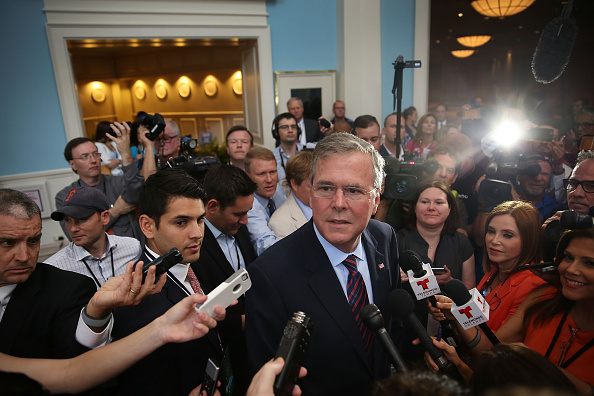
When Danny Diaz named his political consulting firm FP1 Strategies, it was a sign of his hard-charging approach: The name stands for fifty percent of the electorate, plus one vote.
As the new campaign manager for former Florida’s Gov. Jeb Bush’s expected White House bid, Diaz is expected to bring that sharp-elbowed, win-at-any-cost approach to the coming 2016 race, taking over the day-to-day operations of the presumed Bush campaign.
In a sense, he already has, essentially deposing David Kochel, an affable Iowa operative who had been in line for the top strategist job in the Bush political machine. Aides say Kochel will assume the title of chief strategist, tasked with running a state-by-state slog to the nomination.
The internal shakeup comes just days before Bush formally announces his desire be the third Bush to call the White House home. Bush is set to make his plans official on June 15 and remains a leading contender for the Republican nomination, but the last-minute personnel shift was a sign the campaign is retooling its efforts.
Publicly, the Bush orbit portrayed the shifts as positive developments. Bush, spokesman Tim Miller said, is “confident he has the best team in place to ensure his success.” Longtime Bush confidant Sally Bradshaw called the team “unmatched today.” But left unsaid: Bush is trying to right a struggling campaign and is turning to many of the advisers who put his father and brother in office.
Bush’s proto-campaign effort is expected to report raising more than $100 million next month, but the candidate has a long way to go with voters. Other than his massive fundraising haul, he has failed to distinguish himself from the large crop of GOP candidates, and many Republican primary voters in early states as well as nationwide view him with skepticism—or worse—because of his family name and positions on immigration and education. Turning to Diaz, Bush is signaling he is ready to fight his critics, not shrug them off.
As part of the staff shake-up longtime Bush adviser Mike Murphy is leaving the official campaign-in-waiting and moving to a super PAC that will handle many of the responsibilities traditionally shouldered by the candidate’s operations. Chief among them: advertising. Murphy has an unrivaled sense for Bush’s preferences and will be running the deep-pocketed advertising campaign at the Right to Rise Super PAC that is nominally independent of the candidate. By leaving Bush’s inner-circle before he becomes a declared candidate, Murphy can take all of his conversations with Bush and turn them into ads without any legal questions about illegally coordinating. The move was long-telegraphed, but his formal exit from Bush’s official team leaves Bush without his longtime adviser.
Murphy’s role will be split between Kochel and Jon Downs, a Diaz loyalist and a partner at FP1 Strategies. Downs will run the Bush campaign’s advertising operations in-house. If things go as planned, however, much of Downs’ role will be to signal to the super PAC the types of ads the campaign sees helpful and then let Murphy’s operation take over from there. Downs was part of the original team for then-Texas Gov. George W. Bush’s campaign in 2000.
But it is Diaz who will shoulder the biggest share of the new organizational shift that puts one demanding figure working for someone who is equally as famously tough as a boss. “Nobody brings more intelligence and intensity to a campaign. He’s one of a kind. He’s relentless,” said Brian Jones, a longtime Diaz friend.
A Washington, D.C., native, 39-year-old Diaz worked as a plumber before getting hooked on politics. He was a spokesman for George W. Bush’s 2004 campaign and then went to House Republicans’ campaign arm. Acerbic and sarcastic, Diaz is a go-to source for reporters and a must-have fixer for listless campaigns. Phone calls often start with his signature greeting, “dude,” and emails end with a simple “$.”
Diaz knows a thing or two about internal power struggles. In 2008, he was among those who were on the losing end of a reshuffling inside John McCain’s White House bid. Diaz departed and landed at the Republican National Committee, where he was among the loudest, most aggressive critics of then-Sen. Barack Obama’s White House bid. In 2012, he joined former Massachusetts Gov. Mitt Romney’s campaign as a last-minute member of the press team.
Diaz’s addition to the Bush orbit is a sign that the candidate recognizes the prologue to his campaign ignored his very real challenges in communicating with voters and winning their support. Bush now is looking to someone whose approach to campaigns is best described as militant.
More Must-Reads from TIME
- Why Trump’s Message Worked on Latino Men
- What Trump’s Win Could Mean for Housing
- The 100 Must-Read Books of 2024
- Sleep Doctors Share the 1 Tip That’s Changed Their Lives
- Column: Let’s Bring Back Romance
- What It’s Like to Have Long COVID As a Kid
- FX’s Say Nothing Is the Must-Watch Political Thriller of 2024
- Merle Bombardieri Is Helping People Make the Baby Decision
Write to Philip Elliott at philip.elliott@time.com